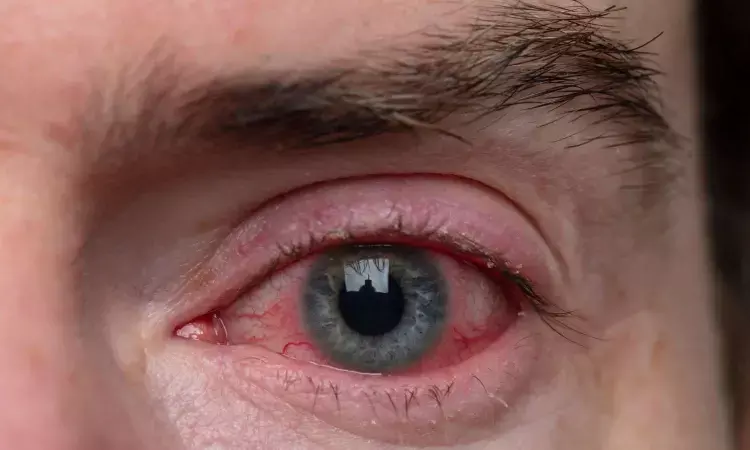- Home
- Medical news & Guidelines
- Anesthesiology
- Cardiology and CTVS
- Critical Care
- Dentistry
- Dermatology
- Diabetes and Endocrinology
- ENT
- Gastroenterology
- Medicine
- Nephrology
- Neurology
- Obstretics-Gynaecology
- Oncology
- Ophthalmology
- Orthopaedics
- Pediatrics-Neonatology
- Psychiatry
- Pulmonology
- Radiology
- Surgery
- Urology
- Laboratory Medicine
- Diet
- Nursing
- Paramedical
- Physiotherapy
- Health news
- Fact Check
- Bone Health Fact Check
- Brain Health Fact Check
- Cancer Related Fact Check
- Child Care Fact Check
- Dental and oral health fact check
- Diabetes and metabolic health fact check
- Diet and Nutrition Fact Check
- Eye and ENT Care Fact Check
- Fitness fact check
- Gut health fact check
- Heart health fact check
- Kidney health fact check
- Medical education fact check
- Men's health fact check
- Respiratory fact check
- Skin and hair care fact check
- Vaccine and Immunization fact check
- Women's health fact check
- AYUSH
- State News
- Andaman and Nicobar Islands
- Andhra Pradesh
- Arunachal Pradesh
- Assam
- Bihar
- Chandigarh
- Chattisgarh
- Dadra and Nagar Haveli
- Daman and Diu
- Delhi
- Goa
- Gujarat
- Haryana
- Himachal Pradesh
- Jammu & Kashmir
- Jharkhand
- Karnataka
- Kerala
- Ladakh
- Lakshadweep
- Madhya Pradesh
- Maharashtra
- Manipur
- Meghalaya
- Mizoram
- Nagaland
- Odisha
- Puducherry
- Punjab
- Rajasthan
- Sikkim
- Tamil Nadu
- Telangana
- Tripura
- Uttar Pradesh
- Uttrakhand
- West Bengal
- Medical Education
- Industry
Novel gene therapy shows promise for treating multiple eye diseases

Researchers from Trinity College Dublin have discovered that a potential new gene therapeutic approach may also be effective in treating patients living with other eye diseases in the future.
The work published in the journal Pharmaceutics details how the gene therapy (ophNdi1) boosts mitochondrial performance in retinal ganglion cells, the cells dysfunctional in diseases such as glaucoma.
The results are consistent with those observed, and previously published by the same group, showing benefit in age related macular degeneration (AMD) models and highlights the potential value of ophNdi1 for multiple eye diseases.
“Because a loss of retinal ganglion cells leads to sight loss in many conditions including inherited optic neuropathies and glaucoma, we are excited that this potential therapeutic approach could provide benefit to many patients in the future,” said Dr Naomi Chadderton, first author of the research article and a scientist in Trinity’s School of Genetics and Microbiology.
“Our study shows that ophNdi1 is protective in three models of mitochondrial dysfunction. Notably, the optimisation of the therapy, which is outlined in the study, allows for use of a lower therapeutic dose.”
Mitochondria are known as the “powerhouses” of the cell because they manage the production of energy, however researchers had previously discovered that their performance decreases in the retina of people with eye diseases. This link to a deterioration in sight led them to investigate the potential of therapies to rescue struggling mitochondria.
The gene therapy ophNdi1 uses a virus to access the cells that are suffering and deliver the code needed to give mitochondria a lifeline, enabling them to generate extra energy and continue to function in supporting vision.
Professor Jane Farrar, senior author of the research article and Professor in Trinity’s School of Genetics and Microbiology, said:
“Our work provides clear evidence supporting using this novel gene therapeutic approach for multiple eye disorders. It also suggests that the ophNdi1 therapeutic platform targeting mitochondrial dysfunction could have applications for other devastating conditions beyond the eye in which mitochondrial dysfunction is in play.”
Reference:
Chadderton, N.; Palfi, A.; Maloney, D.M.; Carrigan, M.; Finnegan, L.K.; Hanlon, K.S.; Shortall, C.; O’Reilly, M.; Humphries, P.; Cassidy, L.; Kenna, P.F.; Millington-Ward, S.; Farrar, G.J. Optimisation of AAV-NDI1 Significantly Enhances Its Therapeutic Value for Correcting Retinal Mitochondrial Dysfunction. Pharmaceutics 2023, 15, 322. https://doi.org/10.3390/pharmaceutics15020322
Dr Kamal Kant Kohli-MBBS, DTCD- a chest specialist with more than 30 years of practice and a flair for writing clinical articles, Dr Kamal Kant Kohli joined Medical Dialogues as a Chief Editor of Medical News. Besides writing articles, as an editor, he proofreads and verifies all the medical content published on Medical Dialogues including those coming from journals, studies,medical conferences,guidelines etc. Email: drkohli@medicaldialogues.in. Contact no. 011-43720751


